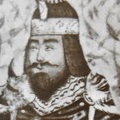|
Fojar38 posted:WWII also has a far better narrative. "Evil empire divides and conquers Europe but everyone heroically rallies together at the last minute and destroys the evil empire" makes for far better movies and video games than "An archduke got assassinated and politics made everyone faff about in trenches dying for a few years and basically nothing was resolved." On the other hand, "German ultra-nationalist and Russian super-communist divvying up Poland, causing British and French conservatives to declare war on Germany but not on USSR, after which Germany forces France to switch sides and invades Russia..." doesn't exactly make for a perfect narrative, especially given that the half of Poland that wasn't permanently annexed to USSR becomes a Stalinist province anyway.
|
|
|
|

|
| # ? Apr 16, 2024 07:25 |
|
Crazy Joe Wilson posted:A teacher I once had put WWII tactics in relation to the experiences in WWI in a very interesting and different light for me. It wasn't necessarily that all of the countries involved wanted to avoid to Trench warfare again, it was simply (in the German and French cases especially) that none of the nations involved could go to Trench warfare as a viable tactic. Trench warfare requires a lot of manpower, as its basically a tactic of attrition. WWI had bled multiple countries dry of entire generations of capable men. Blitzkrieg was a solution to a manpower shortage; striking hard and fast and using numerically inferior forces to trap and defeat larger forces en masse, so you don't get bogged down in a slog. The French were all about static defense with the big defensive fortification they had in Alsace-Lorraine (completely escaping my mind at the moment). Sorry but that's basically all bunk and completely ignores the strategic realities and planning that were involved in the German invasion of France. No one, literally no one, including the Germans, expected the campaign to go the way they did. The campaign was planned to be a long war of attrition and only through sheer fortune and the actions of mid-level commanders did things play out the way they did for the Germans. And even that wouldn't have mattered if not for some of the most criminally incompetent commanding in the history of warfare by the French General Staff. Basically Blitzkrieg didn't exist until after the invasion of France. It was a way to explain the unexplainable and once the Germans bought into their own hype it hosed them over big time when it failed against the Soviet Union.
|
|
|
|
One aspect of WW1 and war in the 20th century in general interests me is how gender plays a role. My research in university is based in international politics, but gender and politics is a personal (and I feel essential) interest of mine that often gets incorporated into my work. Romania is another particular interest that I have, so I thought I’d combine those two with the topic of this thread. I apologize in advance if I don’t do gender studies or feminism enough justice or even confuse terms/gender designations. As well, I borrow a lot of Wikipedia and the Bucuru book for my information in case anyone is interested in reading more about women and war in 20th century. Last semester I took a book out of the library called “Gender and War in Twentieth-Century Eastern Europe.” One part of that book that stuck out in the section on Romania by Maria Bucur was how starvation affected the womanhood of women living in Romania. War takes its toll on everyone, but one example of war taking its toll on gender is the Romania soldier in World War I named Ecaterina Teodoroiu. An “Androgynous Symbol,” Teodoroiu appears in full regalia as a proud soldier. A wartime volunteer (joining because her brothers also fought), Teodoroiu was a 23 year old who had been wounded twice and died in battle charging the enemy. Contemporaries, in generating a narrative about her, labeled her a “virgin” or “young girl” rather than soldier, warrior, fighter, etc. Bucur says this was to avoid (by the state) bestowing masculinist norms on her while also making her distinct from women’s actions on the home front. The death of her one brother invigorated Ecaterina with patriotism that led to her becoming a soldier on the frontline. At one point in 1916 she was captured by Germans but managed to escape by killing two or three German soldiers. She eventually ranked up to command a 25 man platoon. While fighting at the Battle of Mărăşeşti in 1917, a Romanian victory, Ecaterina died while leading the charge against the Germans. Some say her last words were, “Forward, men, I’m still with you!” (It gives me chills to read it in Romanian: “Înainte băieți, sunteți cu mine!”) Her story was buried in the typical masculinization of war where men were the soldiers and women were the domestic targets, often recipients of post-war trauma violence, of clichéd feminine propaganda. Female patriotism was essentially procreation, not fighting on the frontlines. Here is Ecaterina chillin:  Sorry if this isn’t completely on topic, but I found her story awesome and the gendered propaganda of war, of course, disheartening. Maria Bucur’s book is great for a bunch of essays on the subject throughout Eastern Europe.
|
|
|
|
Shimrra Jamaane posted:Sorry but that's basically all bunk and completely ignores the strategic realities and planning that were involved in the German invasion of France. No one, literally no one, including the Germans, expected the campaign to go the way they did. The campaign was planned to be a long war of attrition and only through sheer fortune and the actions of mid-level commanders did things play out the way they did for the Germans. And even that wouldn't have mattered if not for some of the most criminally incompetent commanding in the history of warfare by the French General Staff. Basically Blitzkrieg didn't exist until after the invasion of France. It was a way to explain the unexplainable and once the Germans bought into their own hype it hosed them over big time when it failed against the Soviet Union. You're right, there was plenty of German planning going on in the beginning that expected the war to be one of attrition and half a million casualties just to force the Allies to the Somme, but reality and the fact that they got involved in the war much earlier than their planning and strategy had wanted, meant the Germans had to go a different, desperate route. "Blitzkrieg" itself did not exist as a formalized tactic yet, no, but the Germans were forced away from giant battles of attrition and into other avenues, especially in France, because they couldn't sustain them. Anyways, this is a WWI thread, and we're getting quite a bit off topic.
|
|
|
|
One of my favorite things about World War I that shows just how out of touch military leadership was is that for the first few campaigns the French Army kept the traditional 19th century uniform with red pants. I mean look at this poo poo:  You guys were supposed to be planning for a war! You think the Germans picked gray because it was snazzy?
|
|
|
|
Ah les pantaloons rouge, the world's deadliest pair of pants.Pook Good Mook posted:You guys were supposed to be planning for a war! You think the Germans picked gray because it was snazzy? No but they made it snazzy.
|
|
|
|
It's the classic "fetch me my red underwear/brown underwear" strategy.
|
|
|
|
So the fall of Germany happened shortly after the sailors of the Kreigsmarine rose up in mutiny after being bottled up in port for the entire period after the Battle of Jutland. The questions I have are: why them, and what effect did the rebellion that ended the German war effort have on the peace talks and what post-war Germany was going to look like? As I understand, Germany was on the brink of collapse as a nation, so there would have been a peasant revolt, working class uprising, or the military seizing power from the Kaiser and ending the war themselves, so what made the sailors do it? Was it just a case of the army in nearly total rout from the Hundred Days Offensive and not in a position to do it themselves, or was there something about the state of the navy that made sailors the ones to do it?
|
|
|
|
How timely, BBC asks 10 historians who started WWI: http://www.bbc.co.uk/news/magazine-26048324 I just want to say that it's nice to talk about a serious international crisis that wasn't caused in some part by the United States. Too bad you need to go back 100 years to find one.
|
|
|
|
Konstantin posted:If you're really interested in this topic, I'd recommend the BBC's 26 part documentary about it, called "The Great War". It's all on Youtube, and they make some effort to be neutral, especially considering it was made in 1964. I cannot recommend this series enough. It is the best documentary film on world war I that I have seen.
|
|
|
|
Sylphid posted:As I understand, Germany was on the brink of collapse as a nation, so there would have been a peasant revolt, working class uprising, or the military seizing power from the Kaiser and ending the war themselves, so what made the sailors do it? The Naval Command had decided, for some insane reason, to risk everything in an all-out assault on the British Navy after 4 years of the German Navy just sitting around in the Baltic post-Jutland. Of course, they had been sitting around for the very good reason that engaging the British head-on would be suicide. The sailors mutinied rather than go on an obviously pointless suicide mission that had no hope of changing the eventual outcome of the war and...well...once the mutiny happened it just sort of set off everything else.
|
|
|
|
I was wondering this after doing some reading: Is there a comprehensive list somewhere of diplomatic breakdowns in the decades prior to the war that established the existing alliances?
|
|
|
|
VitalSigns posted:The Naval Command had decided, for some insane reason, to risk everything in an all-out assault on the British Navy after 4 years of the German Navy just sitting around in the Baltic post-Jutland. Of course, they had been sitting around for the very good reason that engaging the British head-on would be suicide.
|
|
|
|
Sylphid posted:So the fall of Germany happened shortly after the sailors of the Kreigsmarine rose up in mutiny after being bottled up in port for the entire period after the Battle of Jutland. The questions I have are: why them, and what effect did the rebellion that ended the German war effort have on the peace talks and what post-war Germany was going to look like? I recently read a book on the topic and if I'm not completely wrong the German revolution was relatively peaceful and led to the most brilliant (and potentially most harmful) political decision ever. That late in the war it was just a question of when the German army would fall. That and the fact that a revolution was spreading made Ludendorff quite nervous. So he decided to give all of Germany to the Social Democrats if they promised to keep the current officers and beat down the revolution. This accomplished two things: It divided the socialists of Germany (the revolution was pretty much social democratic which lead to a funny situation where the social democrats beat down the social democratic revolution) and it made the new republic surrender before the army was beaten. Ludendorff achieved exactly what he wanted: He weakened the socialists of Germany and he kept the "honour" of the military. This is a big part of what would later become the stab-in-the-back myth since the "weak" republicans surrendered before the army was defeated. Ironically Ludendorff (who would later become a National Socialist) was the one who did the backstabbing.
|
|
|
|
Yeah it wasn't so much about siezing power from the Kaiser, because Ludendorff (the army) already had it.
|
|
|
|
WWI is in several ways more scary than WWII. We can see who the main bad guy in the latter was. The Allies also committed war crimes, but at least never engaged in a campaign of planned genocide. Its ending was also quite good, given the circumstances. At least, we can say the people who died fighting Nazis didn't die fighting for nothing. This is not the case with WWI. It happened for completely pointless reason and continued because everyone involved was too stupid and stubborn to give up. Millions of people would enlist to the military, told by everyone this is a good idea, or just conscripted without possibility to refuse. A lot of them died because of their commanders' incompetence, like the British charging German positions in Ypres or Russians being deployed without necessary equipment. Others would get offed by cold, disease and malnutrition. The ones that couldn't cope with their situation and tried to return to their homes were considered traitors by their societies and many of them were imprisoned or even executed. And the people who caused their misery? Despite many of them never being in any real danger, they were lauded as heroes and decorated. Some of them, like Ludendorff, used this respect to cause even more damage. I feel less bad about the fate of Nicolas II after I remember this guy caused death of over 3 millions of his compatriots because of his stubbornness and ineptitude.
|
|
|
|
Sylphid posted:So the fall of Germany happened shortly after the sailors of the Kreigsmarine rose up in mutiny after being bottled up in port for the entire period after the Battle of Jutland. The questions I have are: why them, and what effect did the rebellion that ended the German war effort have on the peace talks and what post-war Germany was going to look like? In addition to what VitalSigns has said about the brass wanting to make a last suicidal sortie to save the fleet's honor, there was by late 1918 a big schism developing between troops at the front and those in reserve/on garrison duty. The latter were increasingly being politicized against the war, and indeed the old order as a whole; there's a reason why, when the Revolution of 1918 breaks out following the armistice that it's naval reserve troops who fight alongside the revolutionaries and Spartacists, against the Freikorps troops (who are mainly demobilized front fighters) backing (for the moment) the Ebert government. The sailors of the High Seas Fleet (I don't think they started using the name Kriegsmarine until after Weimar, but could be wrong about that), at least those of the surface units which weren't really doing much post-Jutland,* fall well into this category of disgruntled troops who had absorbed what anti-war/-state propaganda had escaped the censors. *I qualify this for two reasons. First, despite popular belieg, the fleet did make a few more moves after Jutland, but did never again challenged the Grand Fleet with a breakout. Second, the U-boat arm continued to try to interdict supplies and, increasingly, American troop transports, with less and less success as Britain finally got around to developing effective convoy tactics. lullelulle posted:I recently read a book on the topic and if I'm not completely wrong the German revolution was relatively peaceful and led to the most brilliant (and potentially most harmful) political decision ever. That late in the war it was just a question of when the German army would fall. That and the fact that a revolution was spreading made Ludendorff quite nervous. So he decided to give all of Germany to the Social Democrats if they promised to keep the current officers and beat down the revolution. This accomplished two things: It divided the socialists of Germany (the revolution was pretty much social democratic which lead to a funny situation where the social democrats beat down the social democratic revolution) and it made the new republic surrender before the army was beaten. Ludendorff achieved exactly what he wanted: He weakened the socialists of Germany and he kept the "honour" of the military. This is a big part of what would later become the stab-in-the-back myth since the "weak" republicans surrendered before the army was defeated. Ironically Ludendorff (who would later become a National Socialist) was the one who did the backstabbing. The Revolution of 1918 is a little more complicated than this, though you broadly outline why it had such disastrous long-term consequences for Germany and indeed Europe. First, Ludendorff was more or less out of the picture by the time the revolution started; he had resigned at the Kaiser's insistence as he'd frankly straight-up been insubordinate with the new Chancellor, Prince Max of Baden, who had the stones to demand the Kaiser choose between the two of them. The SPDs had gone out of their way to appease the army as it marched back, Erzberger making more than one "Army undefeated on the field of battle" speech to welcome troops back to Berlin, in large part as the SPDs knew how fragile their coalition was, and that the threat from the radicals was real and growing (particularly if more disgruntled garrison troops came over to their side as I outlined above). The high command, which by this time is Hindenburg and Groener as you note, see the opportunity to maintain at least their own prominence in the new order and much, if perhaps not all, of the military's traditional exceptionalism within the German state, and as such when Ebert comes calling are willing to throw in against the revolutionaries. It should also be noted that while not particularly bloody by the standards of Russia in 1917, or the front itself, the suppression of the Spartacists in particular did see some nasty street fighting in Berlin, and a fair amount of reactionary violence after the Freikorp won and went hunting for ringleaders. Captain_Maclaine fucked around with this message at 16:13 on Feb 16, 2014 |
|
|
|
What gets me was the sheer number of working men slaughtered in the first world war. I was rather shocked as a New Zealander to find that roughly 58,000 of our lads basically either died or were gassed/shot to poo poo/maimed. A 60% casualty rate. 60% We lost roughly 10% of the population in that one. It's drat difficult to even imagine that kind of Decimation. Still, at least we keep our sides well fed.
|
|
|
|
A topic of interest might be the evolution of the German military system over the course of the war (particularly the land forces). At the outbreak of the war, the army was split into bodies of forces controlled by different political units within the (bizarre and mostly dysfunctional) German empire (right?). I read a book some time ago about Tirpitz and the German strategic naval laws of the 1890s, and it made the observation that the Navy was a distinctly different organization than the Army in Germany, being far less aristocratic and really the only "national" (pan-empire?) military organization. (That's the book that led me to write the "bizarre an dysfunctional" comment; it pointed out that the most amazing thing about the Imperial government was that they were able to get anything done at all.)
|
|
|
|
If you want a good WWI movie, watch "Oh What a Lovely War". Great film.
|
|
|
|
Mycroft Holmes posted:If you want a good WWI movie, watch "Oh What a Lovely War". Great film. The ending of Paths Of Glory is amazing. (The whole movie is amazing, really.)
|
|
|
|
emfive posted:A topic of interest might be the evolution of the German military system over the course of the war (particularly the land forces). At the outbreak of the war, the army was split into bodies of forces controlled by different political units within the (bizarre and mostly dysfunctional) German empire (right?). Yes, but only the Bavarians had an actual Army of their own. Everyone else copied the Prussian model and was fully integrated into the Prussian Army (the Saxons maintained control of their army in peacetime). Its somewhat comparable to the US National Guard units in that regard. quote:I read a book some time ago about Tirpitz and the German strategic naval laws of the 1890s, and it made the observation that the Navy was a distinctly different organization than the Army in Germany, being far less aristocratic and really the only "national" (pan-empire?) military organization. (That's the book that led me to write the "bizarre an dysfunctional" comment; it pointed out that the most amazing thing about the Imperial government was that they were able to get anything done at all.) Its not that bizarre if you keep in mind its creation: the constitution was written by Bismarck, for Bismarck. More than that, it was written with a rather passive monarch like Wilhelm I in mind. It broke down when Wilhelm II took the throne and sacked Bismarck, though. But I don't quite get why you would call it dysfunctional.
|
|
|
|
ArchangeI posted:Its not that bizarre if you keep in mind its creation: the constitution was written by Bismarck, for Bismarck. More than that, it was written with a rather passive monarch like Wilhelm I in mind. It broke down when Wilhelm II took the throne and sacked Bismarck, though. But I don't quite get why you would call it dysfunctional. Well I'm by no means an expert; I'm basing my opinions mostly on Steinberg's Yesterday's Deterrent (Tirpitz And The Birth Of The German Battle Fleet). Jonathan Steinberg posted:The Navy was involved in this turmoil about national identity, not only because of its geographical and constitutional dependence on the success of the German nation-state, but also by its financial dependence on a Reichstag elected by universal suffrage. Each time it presented its budget, it confronted the whole spectrum of national disunion at once. The Reichstag elected in 1893 for five years happens to be the one which Tirpitz faced in November 1897, but its make-up is reasonably representative of the Reichstags elected between 1880 and 1900. It had to begin with two types of conservatives (extreme agrarian and moderate), three types of liberal (National Liberal, Radical Union, and Radical People's Party), a Catholic Centre party with 96 deputies of whom about one third were strong "states righters" from Bavaria, and it had 44 Social Democrats. It also had 52 deputies whose presence reflected the patchwork quality of Bismarck's Reich, that is, the 19 Poles, the 32 Hanoverians, Alsatians, and Danes, and the 16 anti-Semites. The composition of this Reichstag meant that there was neither a government nor a "national" majority. ... Approximately 13 per cent of the deputies were entirely opposed to the Reich as it stood (Poles, Alsatians, etc.) for national reasons, another 10 per cent (the Social Democrats) for ideological reasons, another 24 per cent (the Centre) more or less opposed for religious reasons. In Bismark's sense, more than half of the deputies in the Reichstag were "enemies of the Reich". quote:The really remarkable feature of the constitution of the German Empire was that it worked at all. Although it operated less and less successfully after Bismarck's powerful personality ceased to be its driving force, the fact remains that the Kaiser was able to find ministers and chancellors who managed to get something done, however frustrating they may have found the process. Although Tirpitz had to threaten to resign no less than four times within his first eighteen months of office, he did not have to carry out the threat, and remained in the office for nearly twenty years. During peace-time Tirpitz never suffered a really serious defeat in his programme. It was only when war broke out that the constitution slowly collapsed. All its latent flaws and sources of confusion came to the surface, and Tirpitz's fate fulfilled the prophecy which he had made more than thirty years earlier. "In that moment when we are placed before the question of our destiny ... the Imperial Naval Office with one blow becomes a cipher." The book is about Tirpitz and his policy success(?) of establishing the framework for rapid naval expansion in the decade before the war broke out. It's out of print I think but there are usually copies on ebay etc.
|
|
|
|
ArchangeI posted:Yes, but only the Bavarians had an actual Army of their own. Everyone else copied the Prussian model and was fully integrated into the Prussian Army (the Saxons maintained control of their army in peacetime). Its somewhat comparable to the US National Guard units in that regard. Mirabau's earlier statement was still broadly true for Wilhelmine Germany: "Prussia is not a state with an army, it is an army with a state." quote:Its not that bizarre if you keep in mind its creation: the constitution was written by Bismarck, for Bismarck. More than that, it was written with a rather passive monarch like Wilhelm I in mind. It broke down when Wilhelm II took the throne and sacked Bismarck, though. But I don't quite get why you would call it dysfunctional. Well in the larger sense it did have structural problems in that the state had some of the trappings of liberal democracy but was itself a product of Bismarckian nationalism as you note, which detached ideas of the nation from classic liberalism (ie: "not by speeches and majority decisions, but by blood and iron"). I'd agree it's not quite right to call it dysfunctional, but it certainly was brittle, and likely headed towards some manner of crisis even if the war hadn't come along. Particularly as many German conservatives saw the onset of war as a good thing as it would be another unifying national struggle like 1870.
|
|
|
|
Since people were talking about Tannenberg, I'm surprised no one has mentioned Solzhenistyn's "August 1914". Granted, it is a blend of history and fiction but very much worth the read if you want an understanding of the Russian perspective. And people keep coming back to what a putz the Kaiser was. This is hard to overemphasize. The only other leader I can think of that was as horrifically incompetent is George W Bush. From alienating nobles in his own country (the Constitution was "ingeniously contrived chaos" and the Kaiser was simply not up to task on working with that chaos), to not working with the Bundestag (normal for Hohenzollerns but he went out of his way to be a dick about it), to wanting to impress Britain so he builds up a naval fleet to impress them* . . . all coupled with a massive inferiority complex. The Great Man narrative is a poor lens with which to view history but holy poo poo it's hard not to point at Kaiser Wilhelm and not go "Yeah, that guy. He really hosed it up." Stupid cancer. That really hosed poo poo up. *The recession in the 1890s was also a major reason for the naval build-up but those jobs could have been created elsewhere.
|
|
|
|
Shbobdb posted:... to wanting to impress Britain so he builds up a naval fleet to impress them* I think there was a lot more to German naval expansion than just the Kaiser's fancy, though the Kaiser was definitely a supporter of a much-expanded German Navy. From the 1890s, the only real way to become a world power was a modern blue-water navy, so for the Kaiser and for the nationalists in the Imperial Navy they didn't have much of a choice. Britain was almost the inevitable opponent, for obvious geographic reasons but also because Britain already had an enormous navy and a worldwide empire. (I'm not trying to argue anything in particular here; I find the subject interesting.) [edit] oh and another really good book that (among lots of other things) touches on the development of German nationalism in the 19th century is Schama's Landscape And Memory. I guess there are probably quite a few books on that topic, but I like that one because Schama's an art historian primarily and I like art 
emfive fucked around with this message at 19:16 on Feb 16, 2014 |
|
|
|
Shbobdb posted:And people keep coming back to what a putz the Kaiser was. This is hard to overemphasize. The only other leader I can think of that was as horrifically incompetent is George W Bush. From alienating nobles in his own country (the Constitution was "ingeniously contrived chaos" and the Kaiser was simply not up to task on working with that chaos), to not working with the Bundestag (normal for Hohenzollerns but he went out of his way to be a dick about it), to wanting to impress Britain so he builds up a naval fleet to impress them* . . . all coupled with a massive inferiority complex. The Great Man narrative is a poor lens with which to view history but holy poo poo it's hard not to point at Kaiser Wilhelm and not go "Yeah, that guy. He really hosed it up." Stupid loving cancer. Like, it's questionable whether Frederick III would have been alive by World War I or if not, if his policies could have stopped it. But goddamn, at least the man was a successful general, knew the horror of war first-hand, and was generally liberal. You don't have to skip ahead to George W Bush to find someone as incompetent as Wilhelm. Nicholas II was pretty special all on his own. We've already covered how he kind of blundered into the war by not having the stones to tell his generals that they can too cancel the mobilization if the Czar tells them to. We already covered the disastrous defeat by Japan, and the way he handled the 1905 protests that ended in his troops firing on unarmed marchers and set off a revolutionary wave that nearly toppled the government then, but he was a disaster during the war too. Once the war started, at least Wilhelm had the good sense to let the generals handle military strategy. After the reverses of 1916, Nicholas responded to criticisms of his weakness and of Russian defeats by appointing himself commander-in-chief of the military and left the capital to conduct the war personally. Obviously, since he had no military experience, his generals did the best they could to keep him from meddling and were mostly successful at giving him make-work like troop reviews and handing out medals. Meanwhile, the capital was left to be governed by his unpopular wife instead of, you know, someone with experience and credibility, and Nicholas responded to every telegram warning him about the worsening situation in the capital with "quit bothering me with your whining, it can't be that bad." Oh yeah, and the morning of the revolution, he prorogued the Duma and told the military to end the strikes by force, leaving the capital without any legal government at all when the soldiers* objected to gunning down women and children and switched sides. Everything Nicholas did. Everything.  v v*The old Czarist soldiers of course, never balked at a command to massacre the peasants, but they were all in unknown graves in Galicia and Poland by this time
|
|
|
|
I agree Nicholas II was something special . . . but Russia was already pretty hosed by that point. Even a highly competent leader wouldn't have been able to do much with the sick man. In contrast, Kaiser Wilhelm was dealt a really strong hand and managed to gently caress it up in a really major way.
|
|
|
|
Well, Lenin and then Stalin managed to build up a superpower from that blasted ruin (further ruined by a long civil war, even). Admittedly they did have a lot of revolutionary fervor going for them and access to tools that the old monarchist system just didn't, but there was nothing inherent in Russia's state cirka 1900 that prevented it from being at least competently managed. Apart from having an idiot for autocrat, of course.
|
|
|
|
National leaders from the period are pretty poo poo across the board. Speaking of terrible leadership, any good books that cover Italy's loving depressing involvement in detail?
|
|
|
|
Russia had a lot going against it. First there is the basic resource problem (especially as it relates to food), port problem and river problem which have been major banes throughout its entire history. Couple those problems with a massively dysfunctional social order and progress isn't going to happen. The destruction of the moribund social order post-WWI is one of the key components that allowed for explosive growth in the Soviet Union. Maybe, maybe if Alexander III hadn't been such a reactionary changes made under Alex II could have continued and allowed for the organic creation of a social order that would have allowed for a smoother path towards modernity. Personally, I don't think so because the tensions between the noble class and the peasant class was way too strong and way too entrenched by that point. The world doesn't need another Sonderweg. The revolution and subsequent civil war resolved that tension by clearing the air.
|
|
|
|
YodaTFK posted:National leaders from the period are pretty poo poo across the board. If you're a fan of Hemmingway, A Farewell to Arms includes a pretty solid section on the Caporetto disaster and near-collapse of the Italian Army. As to anything covering the political history of Italy, I can't think of anything off hand, sorry. V. Illych L. posted:Well, Lenin and then Stalin managed to build up a superpower from that blasted ruin (further ruined by a long civil war, even). Admittedly they did have a lot of revolutionary fervor going for them and access to tools that the old monarchist system just didn't, but there was nothing inherent in Russia's state cirka 1900 that prevented it from being at least competently managed. I dunno, Russia had an entrenched class of professional revolutionaries that had been trying for going on a century to topple the Autocracy in one way or another, which there was no real equivalent of in Germany that I can think of. I can't help but think that played a pretty important part in keeping the state unsettled, particularly with what went down 1904-05.
|
|
|
|
Captain_Maclaine posted:I dunno, Russia had an entrenched class of professional revolutionaries that had been trying for going on a century to topple the Autocracy in one way or another, which there was no real equivalent of in Germany that I can think of. I can't help but think that played a pretty important part in keeping the state unsettled, particularly with what went down 1904-05. I have no idea what a "entrenched class of professional revolutionaries" means but the left was completely marginalized in Russian society and ultimately grew because almost no new reforms had taken place since the 1860s. Anyway, Russian society until 1905 was generally very stable, just economically decades behind with a near vertical class system and a completely autocratic government. Also, the Decemberists and Bolsheviks being of the "same class" is rather ridiculous. Yes though launching a coup against the very Duma you created, probably did make things more unstable. Ardennes fucked around with this message at 21:24 on Feb 16, 2014 |
|
|
|
Ardennes posted:I have no idea what a "entrenched class of professional revolutionaries" means but the left was completely marginalized in Russian society and ultimately grew because almost no new reforms had taken place since the 1860s. Anyway, Russian society until 1905 was generally very stable, just economically decades behind with a near vertical class system and a completely autocratic government. I mean that since at least the Decembrists there was in one form or another professional revolutionaries within the intelligentsia. Yes, at times they were pathetic to the point of being at best fodder for political cartoonists, but through the People's Will and other groups the Bolsheviks and others had a legacy of propaganda of the deed and other direct action going back well into the 19th century in a way that the other great powers didn't (save, possibly, Austria-Hungary).
|
|
|
|
Captain_Maclaine posted:I mean that since at least the Decembrists there was in one form or another professional revolutionaries within the intelligentsia. Yes, at times they were pathetic to the point of being at best fodder for political cartoonists, but through the People's Will and other groups the Bolsheviks and others had a legacy of propaganda of the deed and other direct action going back well into the 19th century in a way that the other great powers didn't (save, possibly, Austria-Hungary). They just weren't that meaningful (the assassinate of Alexander II while well organized were a very small circle) on a social scale, and ultimately they were the result of the monarchy honestly not making any real change for a long time and once it did sort of half-assing it then mostly forgetting about it. (Also, you seem to be omitting 1789/1830/1848/1870 so... yeah there were actually quite a few revolutionaries in Europe during that period. If anything they gave the Russians a lot of their inspiration.)
|
|
|
|
Captain_Maclaine posted:I dunno, Russia had an entrenched class of professional revolutionaries that had been trying for going on a century to topple the Autocracy in one way or another, which there was no real equivalent of in Germany that I can think of. I can't help but think that played a pretty important part in keeping the state unsettled, particularly with what went down 1904-05. Absolute monarchy can never fail, it can only be failed 
|
|
|
Ardennes posted:(Also, you seem to be omitting 1789/1830/1848/1870 so... yeah there were actually quite a few revolutionaries in Europe during that period. If anything they gave the Russians a lot of their inspiration.)
|
|
|
|
|
Nessus posted:I am not sure which one was in 1830; however, the French revolutionaries became the establishment, while I gather a lot of the people from 1848 in the Germanies decided to hit the road and ended up fighting for the Union over here. I imagine the idea is that there wasn't a successful Russian revolution in the sense of one that actually got rolling, whether or not it eventually failed. 1830 was the July Revolution where an Orleanist-led movement threw out the restored Bourbons and ran France until the hungry 40s and 1848. You've articulated better than I did sort of what I was driving at, that though there was any number of revolutionary movements elsewhere in Europe from the end of the 18th century through the 19th and into the 20th, elsewhere they tended to do their thing and either become the new established order, or fail and burn out/move on. Ardennes may consider it hair-splitting on my part, but I see there being considerably more continuity among the anti-Autocracy/Monarchy movements in Russia throughout this period, making events culminating in 1917 all the more likely than elsewhere (again, possibly save Austria-Hungary due to its problem of ethnicities).
|
|
|
|
Nessus posted:I am not sure which one was in 1830 Wikipedia posted:The Revolution of 1830 can be: In the context of WWI, the creation of Belgium might have some relevance, perhaps. Not that I know anything. Hopefully someone here can offer an informed opinion on it.
|
|
|
|

|
| # ? Apr 16, 2024 07:25 |
|
Going a bit back (prior to the French Revolution), the Lowlands was split between a Catholic Spanish/Austrian ruled Netherlands (basically Belgium, which was semi-independent) which itself was can split between "Dutch" Flanders and "French" Wallonia, and the Calvinist Dutch Republic (which was also a semi-Monarchy). During the French Revolution the Austrian Netherlands was annexed by Revolutionary France and the Dutch Republic had its own revolution and became the Batavian Republic, before itself being annexed/turned into a French puppet monarchy by Napoleon. In the Congress of Vienna the whole area was put under the Kingdom of the Netherlands with the former Dutch Stadtholder now becoming an official monarch. Historically "Belgium" was always seen as a type of buffer state between France and "Germany", with France hoping to annex it (or even just Wallonia) if possible.
|
|
|































